When the former American automobile giant Oldsmobile met an ill fate because it ignored the need for innovation, it was a nod to the need for effective team assessment.
Those in charge of innovation at Oldsmobile turned a blind eye to fuel efficiency, made no amendments to design, and ultimately failed to innovate.
It paints a picture of a team with potential that failed to thrive because it lacked thoughtful leadership and guidance from a forward-thinking perspective.
Businesses need to foster a climate of high-performance teamwork and lead their teams to the forefront of growth, to excel in the long run.
What’s essential to stay afloat is getting to the bottom of the issues and coming up with workable solutions through proper assessment and course correction.
So how can you set yourselves up to assess teams effectively?
It’s simple. You must perform a structured team assessment to analyze, identify, and resolve issues.
This article goes over everything you need to know about such assessments, including what they are, how they can benefit your company and lead to growth, and how you can create one.
Let’s start with the basics to understand what such assessments entail.
What Is a Team Assessment?
A team assessment is a tool that helps team managers and employers identify & address issues arising within their teams. This is to ensure cohesiveness and improve areas that are the key indicators of a productive team.
Team assessment is essential in transforming the landscape of teamwork. It’s the perfect starting place for anyone looking to overcome the dysfunctions in a team and realize its true potential.
Here are some examples:
- Myers Briggs: This is a time-tested personality test you’ve probably heard of. It helps understand four mental functions and which one the individual prefers to use first. It helps identify which type, of the 16 different personality types an individual possesses.
- Strengthsfinder: This proven tool helps identify the top five strengths of an individual. It’s a great tool to determine how individuals can experience increased engagement by leveraging their strengths.
- Leading From Your Strengths: This assessment helps understand the natural strengths, adapted strengths, the value an individual adds to the team, their ideal work environment, their current environment’s impact on their strengths, etc. This assessment is best for existing teams.
- Leadership Practices Inventory: This is a 360-degree assessment tool based on The Five Practices of Exemplary Leadership model. This assessment helps measure an individual’s leadership potential.
- EQ-i: This scientific assessment tool measures an individual’s emotional intelligence and offers insights for improvement.
Read: What Is a Personality Assessment?
In the next section, you’ll learn all the possible scenarios for using such assessments.
When to Conduct a Team Assessment
Contrary to the notion that team assessments should be conducted after things go haywire within a team, they add more value to team productivity when conducted at regular intervals.
While the former is a perfectly sound reason, you can reap more benefits by assessing your team in certain situations, such as:
1. When You Need to Get a New Team Started Right
The need to expand a team is one of the indicators of your company’s growth. While you decide to add more members to the existing teams, it’s crucial to test what’s working best with the existing members with an assessment. You can then apply the knowledge you gain from that assessment to the new members.
For example, you can use a workplace communication skills assessment to assess how well the team members can communicate with each other. This assessment will reveal if employees can comfortably share ideas and collaborate in a trust-building way.

To get a new team started right, you must also assign each member the right roles. An employee personality assessment can come in handy for this.
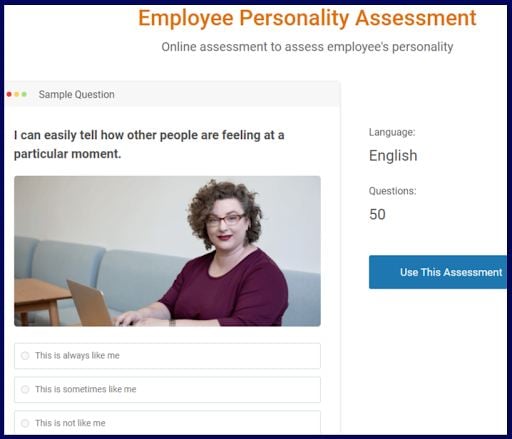
2. When You Need to Boost Remote Work Productivity
If you’re planning to embrace the ongoing trend of switching from ‘working from the office’ to ‘working from home,’ you may want to consider using team assessments to ensure high productivity.
Even though the switch may lead to more flexibility, it may also lead to miscommunication and disconnect within the teams. You can use an assessment to identify any such disconnect within your team and find ways to make your team feel more connected and engaged.
For example, you can also conduct a communication skills assessment to understand the communication abilities of team members and use that understanding to deliver effective communication training.
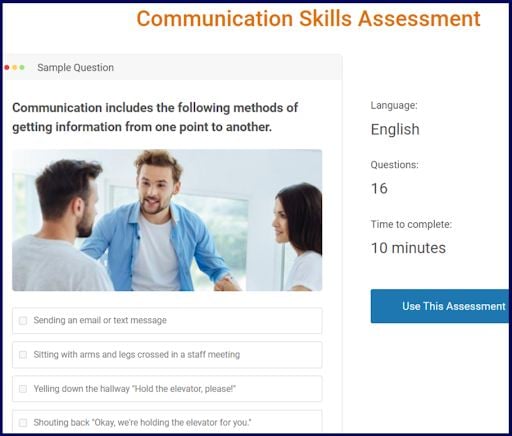
Some remote workers may also be facing trouble managing their time. You can conduct an online assessment to check if your team members can plan their tasks properly while working in a non-office environment.
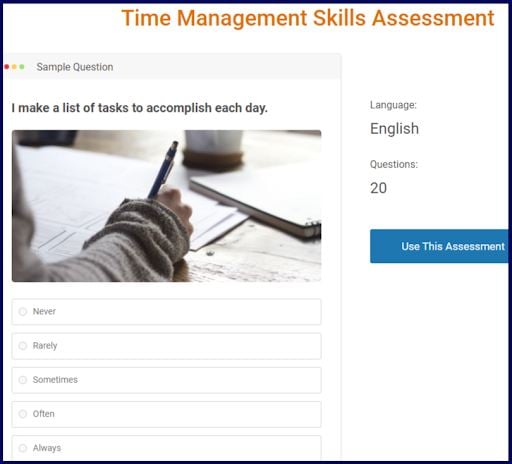
Pro Tip: Besides assessments, you can also conduct fun virtual team quizzes to bond team members who may have never met face to face.
3. When You’re Making a Major Strategic Shift
Businesses constantly go through changes and try to keep up with such changes and evolve.
While some team members can easily adapt to such changes, it can be challenging for others.
Online assessments can help you make the transition smoother for those team members by helping you learn what troubles they’re facing. You can then come up with the right plan of action.
For example, you can conduct a change management skills assessment when you need to learn if your employees have the desired skills and abilities to keep up with the changes in your company’s annual goals, processes, or technologies.
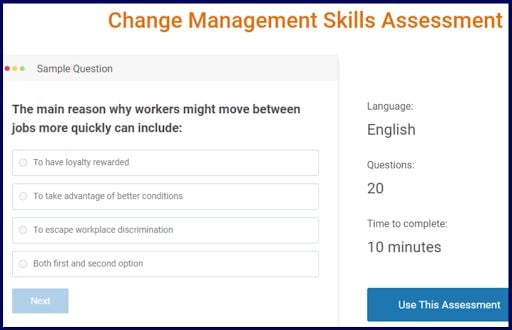
When making a major strategic shift or campaign towards a big goal, you must also assess your employees’ critical thinking abilities to see if they’re capable of the deft problem-solving and decision-making that such a change would require.
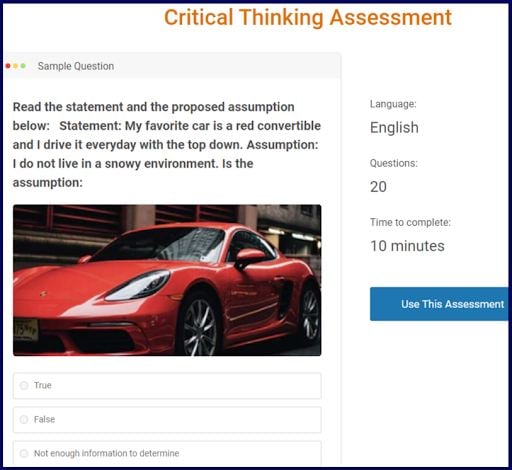
4. When You’re Starting a New Project
When starting a new project, you need people who can understand complex situations, recognize patterns, solve problems, and exhibit creativity. You can conduct team assessments to recognize such people.
For example, you can conduct psychometric assessments to identify people with strong cognitive abilities, such as logical reasoning, abstract reasoning, etc.
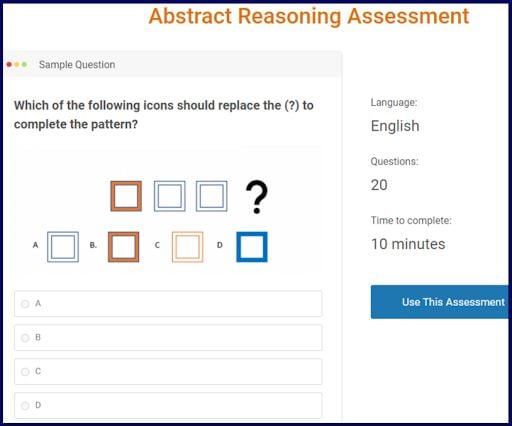
5. When You’re Developing Leaders or Managers
You can conduct a team assessment when you have to choose a leader or manager on a temporary or permanent basis, e.g., for projects or team leaders during succession planning.
Here’s an assessment that can help you identify future leaders from among your team.
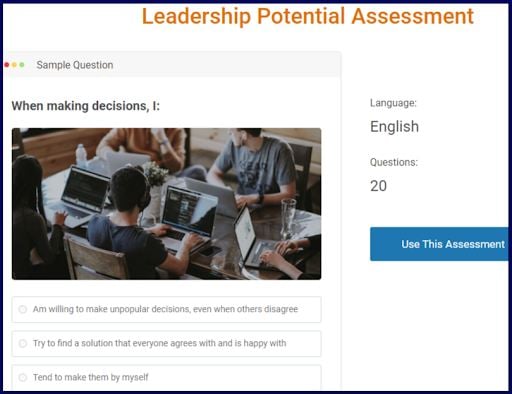
And here’s one to find out which team members have excellent team management skills.
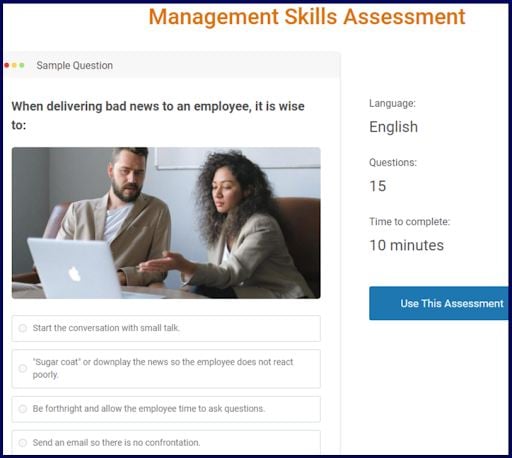
6. When You Need to Strengthen a Team That is Having Problems
Conflict of interest or difference in opinion is inevitable within teams. There can be instances where you feel it’s getting out of hand and impacting the overall team productivity.
When you face any issue like this, know that it’s the right time to conduct an assessment to get individual feedback and diagnose the issue before you set out to strengthen the team.
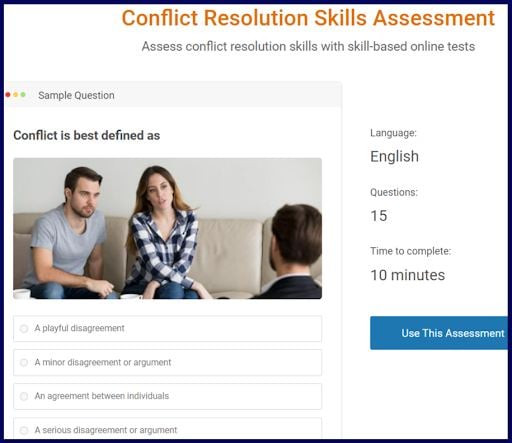
See how online assessments can help you in different ways? But there are more!
We’ve condensed these into five major benefits of using a team-building assessment. Discover them in our next section.
Benefits of Team Assessment for Team Development
Let’s look at how assessing your team can help you as an employer or a team manager:
1. Enhanced Vision
An efficient team manager invests their time and effort into exploring and understanding the overall purpose and vision of the team. From this vision, you can develop goals and objectives that’ll help your team stay focused and on track.
Assessment requires participation, which is a key factor in articulating a vision. Of course, you can brief your team members about the vision, but they may or may not find it worth working meticulously for.
But, if you encourage participation and have them see how their contribution adds value to the overall vision, you can form the basis of a high-performing team.
It’s the team’s vision that pushes it towards its goals.
2. Improved Understanding & Collaboration
A team’s synergy distinguishes effective teams from ineffective ones. When team members play to their strengths and compensate for each other’s weaknesses, it often results in good teamwork.
But, that does not mean you don’t need to help your team members improve their weak areas.
Being especially proficient in one skill certainly doesn’t mean there’s no need to improve the others, even if the team members already excel at those skills.
Every member of your team is different from another and possesses a distinct blend of knowledge and experience.
Conducting a team assessment will help you identify the areas of improvement, thinking, and communication skills and will help you leverage your team members’ knowledge and experience for overall team benefit.
3. Better Conflict Management
Conflict is inevitable when working with people with different mindsets, perspectives or behaviors.
A confluence of different perspectives often improves a team’s performance. But, differences in these perspectives can often be the breeding ground for conflicts that impact team effectiveness.
So, it’s only wise to address behavior patterns and understand individual responses to different situations that could be the potential causes of conflicts.
Using an assessment for assessing team behavior will help you:
- Avoid making assumptions about your team members
- Reassure the team that the interaction is confidential
- Remain impartial
The assessment will help you learn more about your team members’ different styles and ways of thinking and working and help you form the basics of your conflict management strategy.
Related Read: How to Create a Conflict Style Quiz for Better Conflict Management
4. Effective Team Management
Conducting team assessments lets managers manage their teams in a more personalized and targeted way.
For example, you can conduct a behavioral assessment to gain insights into team members’ personality traits, working styles, attitudes, adaptability, etc. Using this knowledge you can help them improve their productivity.
On the other hand, conducting a knowledge/skills assessment can uncover crucial training needs you must address for optimal performance.
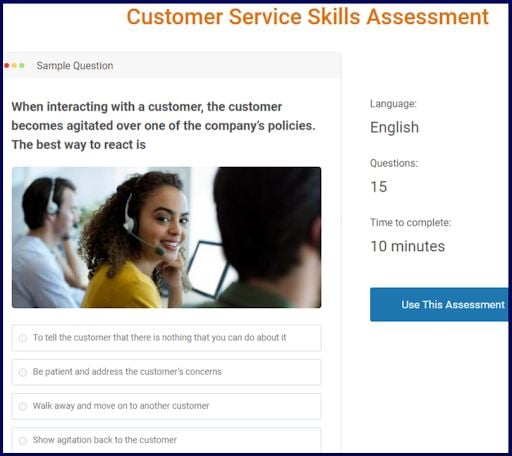
Pro Tip: Once you’ve used a team assessment to identify your team’s training needs, you can deliver the required training using an online learning management system, such as ProProfs Training Maker, which lets you seamlessly build impactful courses featuring videos, presentations, quizzes, surveys, and more.
5. More Engaged Teams
Employee engagement provides several positive business outcomes, such as higher productivity, better customer relationships, lower absenteeism, lower turnover, and more.
Team assessments help improve employee engagement in various ways, such as:
- You can conduct team assessments to empower your employee learning and development programs.
- Using assessments to understand team members’ personalities, leaders can inspire and motivate them better to achieve personal and organizational goals.
- Personality assessments can also indirectly measure engagement levels and reveal the employees you must re-engage.
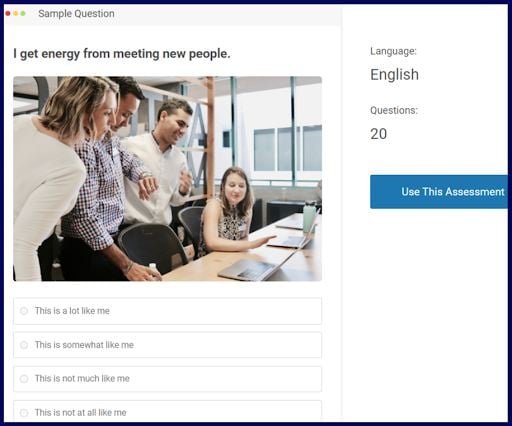
Now that you’ve learned about the benefits, it’s time to tell you the steps you must take to successfully conduct an online team assessment.
Steps to Conduct a Team Assessment
Now let’s learn how to conduct an online team assessment, i.e. from building one to how you can follow up to create a strong learning and development loop.
Step 1: Build an Assessment
The first step in the process is creating an online assessment or test, either with a team assessment tool or an online test maker that helps you assess:
- Your team’s efficiency
- Your team members’ strengths and weaknesses
- Your team members’ opinions
- Your team’s ability to collaborate
- Their ideas & views
- The areas in which your team needs training
You can create various types of questions in your assessment, such as multiple-choice, checkbox, true/false, fill-in-the-blanks, etc.
Remember to include questions that focus on both your team processes and individual team members. You need to create a picture of your team’s dynamics and pave the way for your team to revisit its purpose.
Pro Tip: When assessing your team, ensure that your employees’ goals align with your organization’s. To achieve this alignment, you need to go beyond goal tracking and leverage employee software at all levels. It will help you automatically receive progress updates and tracking reminders, enhancing transparency and goal alignment.
Here’s a video guide to help you learn how to create an online assessment.
Watch: How to Create an Assessment Online
Also check out: How to Create an Assessment: The Ultimate Guide
Step 2: Analyze Assessment Responses
Once you’ve conducted the assessment, analyze your team’s responses to all the questions. If you’re using the right team assessment tool for conducting assessments, the tool will probably generate the reports.
Watch: How to Choose the Best Assessment Software
For example, with ProProfs online assessment software, you get a consolidated report of all your participants’ responses, the time they took to complete the assessment, and more.
What’s more, you can even get insightful statistics for a thorough analysis.
Step 3: Club Team Members in Groups
In the above step, we told you about analyzing the results of the assessments. After you’ve run a thorough analysis, start grouping participants with similar responses.
By similar responses, we mean the participants who come across as highly dissatisfied or those with a potential need for improvement.
Grouping team members will help you take the next necessary step specific to solve their problems.
Here’s a glimpse of online groups created with ProProfs online assessment software:
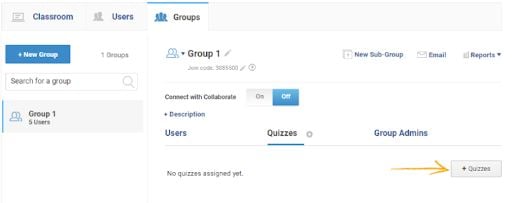
Step 4: Hold Debriefing Sessions
After you’ve analyzed your participants’ responses and grouped them, hold a meeting with different groups. In the meeting, discuss their responses and advise a course of action to move forward.
You can even consult a professional coach who can help you and your team discover, discuss, and plan the next steps for problem-solving.
Once the good ideas come forward, discuss goals and actionable steps to set concrete targets for the team. Ensure that the steps help team members strengthen their commitment, creating more room for meaningful performance improvements.
Step 5: Follow up With Another Assessment
Set goals for your team or team members and follow up with another assessment to see how they’re progressing.
Compare the reports of the new assessment with the previous assessment to draw an analytical conclusion. Base your next action plan on the progress your team members have made.
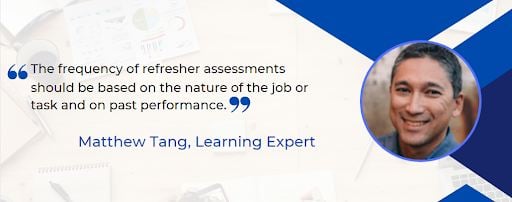
FREE. All Features. FOREVER!
Try our Forever FREE account with all premium features!
Unlock Your Team’s Power & Potential
The key to high-performing teams is assessing your teams effectively and identifying the root causes that disrupt their performance.
Online team assessment is easy and offers one of the fastest ways to build a more cohesive team.
With questions that help assess team members’ behaviors, views, and skills, online assessments provide you with practical and useful data that you can leverage to address the most critical team issues and strengthen the overall team framework.
To ensure that you have a seamless experience creating your assessments and analyzing the results, you definitely need excellent assessment software.
ProProfs is the simplest and most comprehensive assessment solution out there. It offers a clean, easy-to-use interface, with features such as 15+ question types, advanced reporting, robust security, and a powerful resources library with 100+ pre-built assessments and over a million ready-to-use questions.

 We'd love your feedback!
We'd love your feedback! Thanks for your feedback!
Thanks for your feedback!







